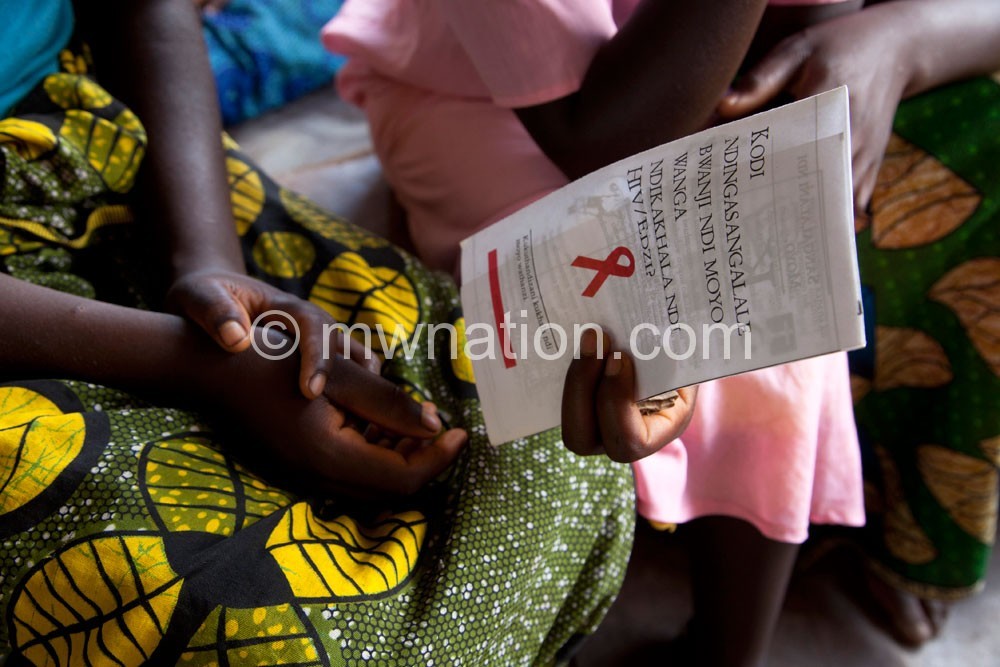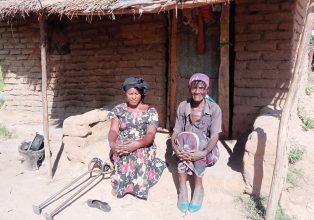Living with HIV confidently
You cannot tell one’s HIV status by appearance. This is true with 40-year-old Prisca Chaima of Mwangata Village, Traditional Authority Somba in Blantyre. Chaima is not only an energetic woman but also a confident person despite being HIV positive.
Since 2012, when she tested HIV positive at Queen Elizabeth Central Hospital (QECH) in Blantyre, Chaima accepted her condition and decided to start spreading HIV and Aids messages so that other people in her village should not catch the virus that causes Aids and which kills about 130 people every day in Malawi, according to UNAids.
 “When I tested HIV positive in 2012, I thought that was the end of my life, but after counselling, I accepted my condition and started living with confidence. I started taking life-prolonging antiretroviral drugs [ARVs] and my health is good up to now,” says Chaima, a mother of three sons and one daughter.
“When I tested HIV positive in 2012, I thought that was the end of my life, but after counselling, I accepted my condition and started living with confidence. I started taking life-prolonging antiretroviral drugs [ARVs] and my health is good up to now,” says Chaima, a mother of three sons and one daughter.
She says her husband died in a road accident in 1998. Since then, she had been going for regular HIV testing and her tests always came out negative, until 2012 when the virus was found in her blood.
Narrating how she got the virus, the second hand clothes-businessperson and subsistence farmer says in 2009 her brother had cancer and was also suffering from Aids. He had wounds all over his body, but the other brothers in the home refused to take care of him. Thus, Chaima took the responsibility of caring for her suffering brother.
Chaima narrates: “Every morning I would bath him and ensure that his wounds were clean.”
The brother died in 2010.
It did not take long before Chaima started feeling unwell regularly. Later, she went for HIV testing at QECH. This was when she tested HIV positive.
“I thought this was the end of my life. Luckily, one day officials from Coalition of Women Living with HIV and Aids (Cowlha) visited our village. They said they came to establish groups of women living with HIV, and I joined the new group,” says Chaima.
Cowlha, which was established in 2006, has been playing a major role in Blantyre rural by fighting against HIV and Aids through the project called ‘Stepping Stone’ or Tiwoloke with funding from United Nations Trust Fund. Cowhla ensures that both HIV positive and negative people should have adequate information about the pandemic. It also fights stigma and gives hope to those living with the virus.
Cowlha district coordinator for Blantyre rural, Shamiso Chingoni, says people like Chaima are making the fight against HIV and Aids easy.
Chingoni explains: “We can easily get to zero HIV infections if people come in the open to reveal their HIV status. We can also easily achieve an HIV-free society if those living with the virus stand up and sensitise others to the dangers of the pandemic. People living with HIV should spread the message, not the virus.”
She hopes openness by people living with HIV such as Chaima will help Malawi in the new 90:90:90 campaign as the getting to zero campaign ends in 2015.
The 90:90:90 campaign aims at enabling the country to diagnose 90 percent of all people living with HIV; put 90 percent of those diagnosed on Anti-Retro Therapy (ART) and achieve viral suppression for 90 percent of patients on ART. This campaign will take Malawi from 2015 to 2020.
Chaima’s confidence extends to revealing her HIV status to youths in her village so that they should know that ‘Aids is real’. She says youths are silently catching HIV under the influence of alcohol.
“With the coming of cheap sachet beers, many youths are catching the virus as they wrongly use condoms due to drunkenness. Others also do not even use a condom when having sex,” she complains.
Malawi, with 93 000 teenagers living with the virus, has 6 900 Aids-related adolescent deaths annually. According to United Nations Joint Programme on HIV and Aids, of the 2.1 million adolescents living with HIV worldwide in 2012, more that 80 percent are in sub-Saharan Africa.
“The best way to curb HIV and Aids in Malawi and the whole world is to give enough information about the pandemic to teenagers. This group is so vulnerable. That is why we conduct door-to-door campaign; spreading the message so that people should not die because of lack of information,” says Chaima.
Sixteen years since the sudden death of her loving husband, Chaima finds joy in helping others avoid contracting HIV so that Malawi can get to zero new infections.




